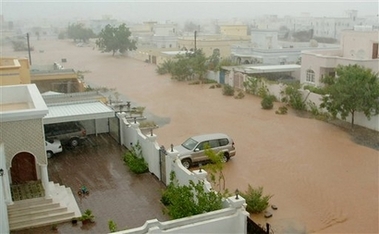Cyclone hammers Oman; veers toward Iran
(AP)Updated: 2007-06-07 13:43
MUSCAT, Oman - Cyclone Gonu battered Oman's coast Wednesday with fierce winds and torrential rains, forcing thousands from their homes and shutting down oil installations before heading toward the world's most important crude oil tanker route.
The center projected Gonu to coninue to decline in power as it headed toward landfall on the southeastern Iranian coast late Thursday. But it was likely to spare Iran's offshore oil installations that lie more than 120 miles to the west, the center and oil officials said.
In Muscat Wednesday, the storm unleashed sheets of rainfall and howling winds rarely seen in the quiet seaside capital. Police and emergency vehicles could hardly move through the flooded streets, and authorities used text messages to warn people away from low-lying areas.
The storm caused little damage to Oman's relatively small oil fields. But raging seas prevented tankers from sailing from Omani ports, effectively shutting down the country's oil exports, said Nasser bin Khamis al-Jashimi of the Ministry of Oil and Gas.
Authorities also closed all operations at the port of Sohar and evacuated 11,000 workers, port spokesman Dirk Jan De Vink said.
To the north, the port of Fujairah in the United Arab Emirates suspended all refueling and ship-to-ship supply operations the world's third-largest shipping fuel center. Ships were allowed to berth but other activities were halted, causing a delay in loading oil tankers, officials said.
A few ships were sailing through the nearby Strait of Hormuz despite 4- to 6-foot swells and strong winds, according to Suresh Nair of the Gulf Agency Co. shipping firm. About one-fifth of the world's oil passes through the narrow waterway at the entrance to the Persian Gulf.
"About 17-21 million barrels a day of oil are coming out of the Persian Gulf. Even if only some of the tankers are delayed, that could reduce the supply of oil and increase prices," said Manouchehr Takin, an analyst at the Center for Global Energy Studies in London.
But Tim Evans, an analyst at Citigroup Global Markets, said the storm shouldn't have a major impact on prices because while it may delay oil shipments, they will eventually get to their destinations. Oil prices rose 25 cents to $65.86 a barrel in midday trading on the New York Mercantile Exchange after initially falling.
As dawn approached Thursday in Oman (11 p.m. EDT Wednesday) the storm had sustained winds of just 52 mph, barely half the its strength of 95 mph of 24 hours earlier, the Joint Typhoon Warning Center said. It was centered about 90 miles north of Muscat and was projected to weaken over the next several hours to less than 40 mph as it moves through the Gulf of Oman toward landfall in Iran.
Even with the weaker wind speeds, Gonu, which means a bag made of palm leaves in the language of the Maldives, is believed to be the strongest cyclone to threaten the Arabian Peninsula since record-keeping started in 1945.
"Historical record in that part of the world doesn't go back that far because these types of storms are very, very unusual for this part of the world. It's likely that parts of Oman have never experienced storms like this," said Julian Heming, a meteorologist at The Met Office, a weather tracking agency within the British Ministry of Defense.
Electricity went out in Muscat on Wednesday, as 62 mph outter band winds battered the capital, and streets and some buildings were flooded. Health Ministry official Ali bin Gaafar bin Mohammed said rescue workers had trouble reaching affected areas.
Flights in and out of Oman's Seeb International Airport were canceled.
Vijayakumar Narayanan, operations manager of a Muscat company that provides call center outsourcing and medical transcription services, wrote in his blog for NowPublic that conditions Wednesday night in the capital were "really horrible and frightening."
"We are unable to go outside of our house. There is a fear of electrocution because there is knee-deep water and the power lines are unsteady. All of my rooms are leaking ... thank God we have enough groceries to get through the next few days, they are saying this is going to continue until tomorrow evening," said Narayanan, a father of three. The Associated Press began working with NowPublic, a journalism Web site, this year to obtain citizen journalism images and video for distribution to news organizations.
Brinda Toprani, an architect from Mumbai, India, who was visiting her parents
in Muscat where her father's company is based, told the AP in a telephone
interview that the storm seemed to be completely over shortly before dawn
Thursday. She said much of the street flooding had receded and that there was no
rain and little wind.
| 1 | 2 |  |
|
||
|
||
|
|

